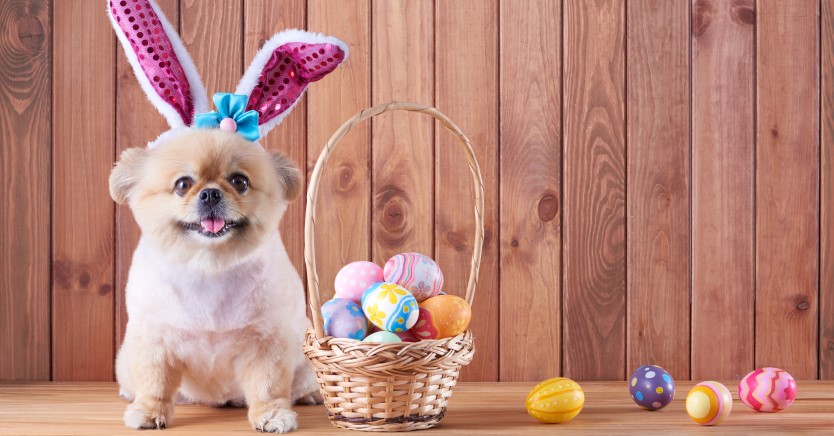Top 10 Easter Hazards for Pets
This Easter season, be wary of hazards that could cause your pet to become stressed, ill, or injured.

Many families enjoy having their pets take part in the Easter fun. However, you’ll want to take certain precautions to keep your pet safe from potential hazards that may lurk in your home. Foods and drinks that humans find tasty may be toxic for your pet! You’ll also want to consider the stress associated with holiday festivities, especially if you plan to celebrate with family or friends. Discover some of the top Easter hazards for pets and how to keep your animals safe this holiday.
1. Chocolate
Chocolate and other candies are a major part of Easter. Unfortunately, chocolate is poisonous to dogs and cats. Chocolate contains caffeine and theobromine which are both toxic to animals. If your pet ingests too much, he or she could suffer diarrhea, vomiting, seizures, and possibly even death. Dark chocolate is also more poisonous than milk chocolate or white chocolate.
2. Easter Lilies
While there are many types of plants that can be dangerous to pets, only certain plants are associated with Easter. Lilies are a common Easter plant that can be especially harmful to cats, causing gastrointestinal upset and possible kidney damage. All parts of the flower are toxic, meaning just a small bite could be very harmful to your pet. If you have animals in your home, it’s best to avoid having Easter lilies.
3. Small Toys
Many parents include small toys in their children’s Easter baskets. These toys are often made of thin plastic which can break into sharp shards that could damage your pet’s insides if ingested. Small toys may also contain pieces that could be chewed or broken off, leading to side effects like diarrhea, vomiting, lethargy, loss of appetite, and pain if ingested.
4. Easter Grass
Stores often sell plastic Easter grass in the spring to provide a soft foundation for candies, toys, and treats. Unfortunately, some pets are attracted to the smell or taste of Easter grass and may choose to ingest it. If swallowed, Easter grass could cause gastrointestinal upset, including possible obstructions that require surgery to remove. Instead of using plastic Easter grass, consider using shredded, recycled paper instead.
5. Easter Decorations
Families often enjoy decorating their homes for Easter. While most decorations are harmless, some can put your pet at risk. Common holiday dangers include electric lights, string tinsel, decorations with batteries, and electronic décor that could catch fire or send electrical shocks. When decorating, avoid décor made of potentially toxic materials. You’ll also want to place your décor in locations that are not accessible to your pet, such as high shelves or inside enclosed cabinets.
6. Easter Foods
Each year, families gather around their dining tables to enjoy a wide array of Easter foods. During these feasts, use caution when giving pets table scraps. Common Easter foods, such as turkey and ham, are high in salt and fat which can contribute to digestive issues and possibly pancreatitis. Foods like garlic and onion are also toxic to pets. Hot cross buns are a staple in many homes during Easter. This tasty treat contains grapes and raisins, which can lead to renal failure in pets.
7. Plastic Eggs
Are you planning an Easter hunt this holiday? If so, you’ll want to keep your pet safely behind a baby gate or in a closed room until after the activity is complete. Pets are often drawn to plastic Easter eggs as they are filled with tasty candies. However, the plastic egg itself can be harmful if ingested. Your pet may also injure its mouth while attempting to chew the egg.
8. Sugar-Free Treats
Today, many sugar-free treats contain a sugar substitute known as xylitol. Xylitol is an artificial sweetener commonly found in various candies, gum, and baked goods. When your pet ingests xylitol, they can experience a drop in blood sugar. In addition, xylitol can lead to seizures and liver failure in both cats and dogs. If you choose to purchase sugar-free treats for your children this Easter, be sure to place them in a secure spot away from your pets.
9. Wrappers
If your pet discovers an unattended Easter basket full of candy, they’ll likely try to eat a few pieces. Your pet won’t remove the wrapper first, meaning they’ll consume the plastic or foil it’s wrapped in, which can cause damage to the throat and digestive tract. Keeping wrapped candies where your pets can’t access them is essential during Easter.
10. Noisy Festivities
During Easter, you may host festivities with friends and family, leading to an increased amount of activity and noise in your home. For some pets, this chaos can be stressful or cause anxiety. To help keep your pet comfortable, have a quiet, safe space where your pet can go, such as a bedroom or a kennel with their favorite blanket and toys. If your pet tends to suffer from anxiety when in the presence of strangers, consider hosting the celebration outdoors or at a separate location.
Keep Your Pet Happy and Safe this Easter
While Easter should be a fun celebration for you and your family, you’ll want to take extra precautions to keep your beloved pets safe! Some basic planning and preparation is all it takes to celebrate the holiday safely.
Ready to start saving money on pet wellness care?
Then take a look at Mint Wellness, the pet wellness plan that provides fast reimbursement on routine pet care. Save on vaccinations, wellness exams, preventatives, dental, and more!
Learn More